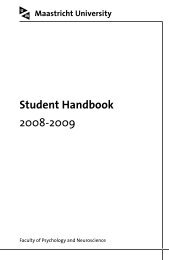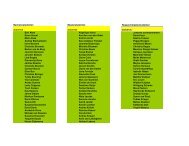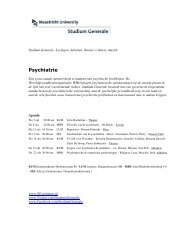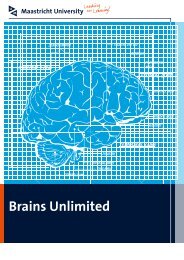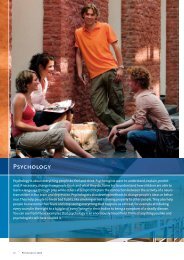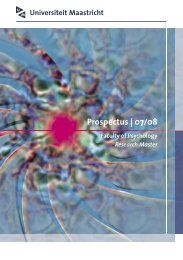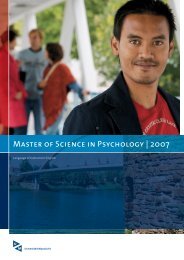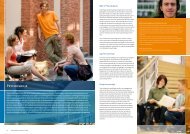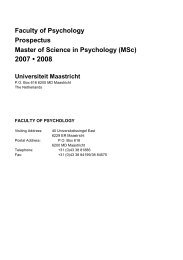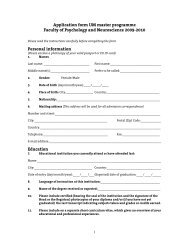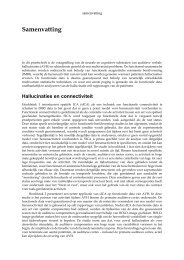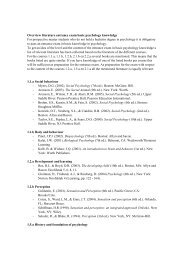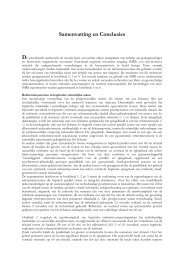Prospectus | 08/09 - Psychology and Neuroscience - Maastricht ...
Prospectus | 08/09 - Psychology and Neuroscience - Maastricht ...
Prospectus | 08/09 - Psychology and Neuroscience - Maastricht ...
You also want an ePaper? Increase the reach of your titles
YUMPU automatically turns print PDFs into web optimized ePapers that Google loves.
<strong>Prospectus</strong> Research Master <strong>Psychology</strong> 20<strong>08</strong> • 20<strong>09</strong><br />
• Applying ethical <strong>and</strong> legal rules in e.g., protocol, case report form, informed consent, etc.<br />
• Ethical <strong>and</strong> legal reviews<br />
Instructional Approach<br />
Lectures, discussion groups.<br />
42<br />
Form of Assessment<br />
Individual presentation.<br />
| 435CN & 436CN Signal Analysis I & II – 4 credits<br />
Coordinators: Fabrizio Esposito, Cognitive <strong>Neuroscience</strong> (FPN), Phone 38 84064,<br />
40 Universiteitssingel East, Room 1.773, E-mail: fabrizio.esposito@psychology.<br />
unimaas.nl; Giancarlo Valente, Cognitive <strong>Neuroscience</strong> (FPN), Phone 38 82469, 40<br />
Universiteitssingel East, Room 4.747, E-mail: giancarlo.valente@psychology.unimaas.nl.<br />
Description of the Course<br />
Traditional <strong>and</strong> advanced statistics provide essential knowledge <strong>and</strong> tools for the<br />
correct formulation of scientific inferences <strong>and</strong> to summarize a research work.<br />
Nonetheless, modern techniques in neuroscience research have strongly enriched the<br />
amount of information that is possible to extract <strong>and</strong> analyze from experimental data,<br />
especially because of the improved spatial <strong>and</strong> temporal resolution of the acquisition<br />
methods. Most of the new information can be recovered by including in the statistical<br />
modelling the “signal” structure of the data, generally due to the physical dimensions<br />
of data, time <strong>and</strong> space. The two “Signal Analysis” courses introduce the practical<br />
implementation of the traditional <strong>and</strong> latest research approaches to time <strong>and</strong> space<br />
signal analysis in the context of neuroscience research.<br />
The first course (Signal Analysis I) focuses on time series analysis from one- <strong>and</strong> multidimensional<br />
data, with special emphasis to image time-series processing. The basics of<br />
discrete time <strong>and</strong> space signal acquisition <strong>and</strong> modelling are presented <strong>and</strong> discussed<br />
in their practical neuroscience applications. The course has the objective to provide the<br />
participants with operational underst<strong>and</strong>ing of the classical signal analysis techniques<br />
like pre-processing, analysis in the frequency, time <strong>and</strong> amplitude domains, Fourier<br />
series, Fourier Transform <strong>and</strong> FFT, spectral analysis, auto- <strong>and</strong> cross-correlation analysis,<br />
convolution <strong>and</strong> deconvolution analysis. Practical demonstrations from real world data<br />
will reinforce concepts introduced in the lectures, <strong>and</strong> concise mathematical tutorials<br />
will be provided to simplify further readings from the technical literature. MATLAB<br />
implementation of these techniques will also be addressed throughout the meetings<br />
The second course (Signal Analysis II) introduces the participants to emerging advanced<br />
signal analysis techniques, including multivariate component-based analysis <strong>and</strong><br />
multiresolution wavelet-based time <strong>and</strong> space signal processing. The course will also deal<br />
with state of the art predictive modelling <strong>and</strong> machine learning for fMRI data analysis,<br />
including Bayesian approaches. Lab sessions in MATLAB will be held during the meetings.



